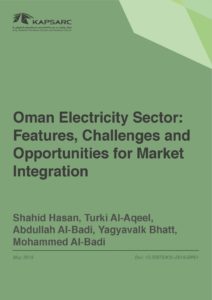Abdullah is currently a professor at Sultan Qaboos University (SQU) College of Engineering in Muscat, Oman. He has published over 160 papers in many well-known international journals, proceedings of refereed international conferences and technical reports. His research interests include renewable energy, distributed generation, power quality, power system analysis and power electronics and drives. Abdullah holds a B.Sc. in Electrical Engineering from SQU and an M.Sc. and Ph.D. from the University of Manchester, England.

Oman Electricity Sector: Features, Challenges and Opportunities for Market Integration
This discussion paper is part of a KAPSARC research project initiated to develop insights that can facilitate the creation of a well-functioning integrated electricity market comprising the member states of the Gulf Cooperation Council (GCC). The project identifies and examines the key issues affecting electricity market integration within the GCC and the wider Middle East and North Africa (MENA) region and suggests the enablers needed to facilitate market integration. This report focuses on Oman’s electricity sector, the liberalization of which started in 2004. The country’s power reforms are now poised to move to the next level, with the aim of creating a more competitive electricity industry in the Sultanate. Key features of Oman’s electricity market, challenges, and opportunities for market integration identified in the paper include: Nearly one quarter of Oman’s domestic natural gas production is used to power electricity generation and water desalination plants. The government’s National Energy Strategy 2040 seeks to ensure the country’s long-term energy sustainability, in part through targeting that at least 10% of electricity output comes from renewables by 2025. The private sector now owns 100% of generation capacity in Oman’s main interconnected system (MIS), and efforts have started to privatize other transmission and distribution firms. Regulatory oversight through a financially and administratively independent regulator with an adequate mandate, the Authority for Electricity Regulation, has played a key role in improving the sector’s performance and has created confidence among new industry players. In future, Oman’s gas network may be included in the regulator’s remit. Oman intends to implement a new arrangement for the future procurement of electricity through the spot market by 2020.
29th May 2019